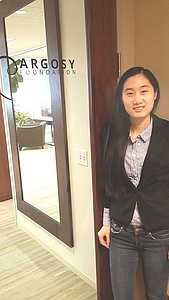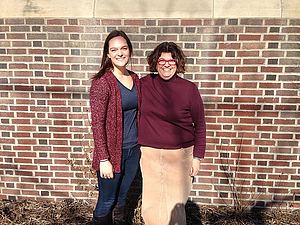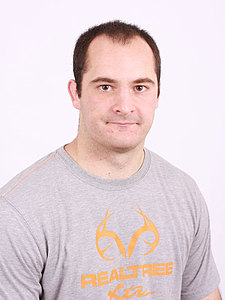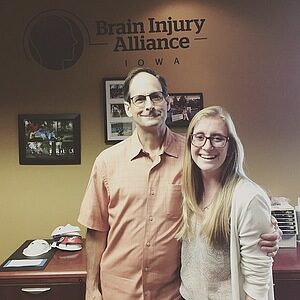Applied Learning
Discover the many ways you can get hands-on learning experience about the field of psychology at Luther.
Internships
1, 2, or 4 hours of credit
Clearly, education is not restricted to a traditional classroom setting. Psychology internships provide the opportunity to earn college credit as you engage in professional activities. These experiences are highly beneficial: you can explore career options, establish professional connections, and evaluate your personal strengths.
Working closely with a faculty member and the Career Center, you can find or design an internship that is related to your chosen career path. In general, students planning to do an internship are expected to take the initiative for making direct arrangements with off-campus professionals and/or institutions.
Prerequisites: General Psychology (PSYC 130), overall GPA of 2.5 or higher and consent of the Psychology Internship Advisor.
Notes:
- students may not receive credit for more than 4 hours while at Luther
- the January internship experience will fulfill the J II (Experiential J-term) general education requirement
If you have questions or need further information, please contact the Psychology Faculty Internship Advisors: Joseph Breitenstein and Stephanie Travers.
You can also visit Handshake. The tool can help you search for internships outside of Luther and make appointments with the Career Center staff.
Collaborative Research
Professor Emeritus Bishop conducts research in the areas of developmental psychology, evolutionary psychology, and psychometric science. Work in his laboratory has recently focused on the role of attachment processes in the adjustment to college. Specifically, the laboratory has been exploring potential mediators of this important relationship. In addition, the laboratory has been developing a new measure of materialism based on attachment constructs. Finally, Dr. Bishop has continued his work in the area of discriminative grandparental solicitude. This research explores how parents and grandparents calibrate their investment in children and grandchildren using adaptive calculus. Dr. Bishop and his laboratory students have recently presented their findings at conferences in New York City, Chicago, and Brazil.
Professor Breitentstein is interested in how mass media affects the stigmatization of mental illness. More specifically, the use of stigmatizing language in typical discourse and how some shows highlighting mental illness (e.g., Dr. Phil) may actually increase stigmatization. His primary method is to employ a paper and pencil measure of stigmatization before and after viewing various media from public service announcements about mental illness to shows like Dr. Phil. He and his student colleagues have found significant differences in stigmatization depending upon how mental illness is presented. For example, public service announcements tend to decrease stigmatization and dramatic presentations like those on Dr. Phil actually increase stigmatization.
Professor Gould has recently been conducting cognition research on dogs with Luther students and a colleague at Knox College. They are investigating how dogs behave when they are faced with an unsolvable task that they are motivated to solve. After dogs learn to open a box to receive a food reward, the box is screwed shut so that it cannot be opened. Professor Gould was interested in two things: 1) how persistent dogs are at trying to open the box and 2) how much time they spend looking at the humans in the room, presumably for assistance. Professor Gould and her students found that dogs were significantly more persistent if they were females, younger, or had more formal training. Pet dogs that were obtained from breeders also looked at their owners significantly longer than dogs obtained from a shelter/rescue. Professor Gould is currently working with a Luther student to compare shelter-housed dogs to pet and foster dogs.
Our attachment relationships to parents and to romantic partners are psychologically important to us—they can provide a safe haven in times of distress, and a secure base from which we can explore the world. Recent research has suggested that for people who are theists, God can serve as an attachment figure. Professor Njus and Lexi Scharmer (’16) explored whether the psychological benefits of having a secure attachment relationship with God are similar to the benefits of secure attachment relationships to adults in our lives.
In a sample of American adults who believe in God, Dr. Njus and Scharmer found that secure attachment to God is associated with lower levels of depression and higher levels of self-esteem. Interestingly, these relationships held even after statistically controlling for levels of attachment to parents and romantic partners and for levels of self-control subjects perceived themselves as having. This research provides further evidence that God can serve as an attachment figure, and that a secure attachment relationship with God is associated with psychological well-being.
How do student employees balance the competing demands of work, school, and leisure activities, and what resources can students’ draw upon when dealing with role conflict? Professor Sprung and his research team have found that the experience of work-school conflict has negative implications for student’s psychological well-being, and some students fare better than others. Specifically, students’ standing on personality characteristics–such as core self-evaluations and recovery self-efficacy–may buffer students from the negative outcomes associated with work-school conflict. Similarly, supportive supervisor behavior is a crucial situational factor that plays a large role in assisting students who are struggling with competing work and school demands. Dr. Sprung and his colleagues have published this research in the Journal of Occupational Health Psychology and the Journal of Organizational Behavior and continue to examine the topic of work-life balance among student and adult workers.
Professor Loren Toussaint is a professor of psychology. He is a consultant to Mayo Clinic, Cancer Treatment Centers of America, Boise State University, and the associate director of the Sierra Leone Forgiveness Project. Dr.Toussaint’s research examines religious and spiritual virtues, especially forgiveness, and how they are related to health and well-being. He and colleagues recently published a compendium of research titled: Forgiveness and Health: Scientific Evidence and Theories Relating Forgiveness to Better Health (Springer). Dr. Toussaint directs the Laboratory for the Investigation of Mind, Body, and Spirit at Luther College.
Professor Travers is a cognitive psychologist who is particularly interested in processes that operate outside our level of awareness and control. In one line of work she uses direct (e.g., surveys) and indirect measures (e.g., Implicit Association Test) to examine whether individuals apply gender labels to mental illnesses. stereotypes on task performance in general and on basic cognition in particular. A related question investigates the impact of sexist stereotypes on task performance in general and on basic cognition in particular. A second line of work explores the benefits of nontraditional therapeutic activities such as gardening or music on attention and memory processes in the elderly.
Student Organizations
The Psychology Club is a social organization that is open to all students who are interested in psychology. Our purpose is to promote an understanding of psychology as a broad discipline, provide information on psychology careers and career development, and foster interaction between students and the psychology faculty.
Some recent activities of the club include:
- field trip to Mental Health Institute (MHI; Independence, Iowa)
- psych Club Relay for Life team
- faculty research opportunities
- student vs. faculty: Semester Kickball Kickoff
President: To Be Determined
Faculty Advisor: Dr. Justin Sprung
Email the Psychology Club: psychclub@luther.edu
Psi Chi is the International Honor Society in Psychology, founded in 1929 for the purpose of promoting excellence in scholarship and advancing the science of psychology. Membership is open to graduate and undergraduate students who are making the study of psychology one of their major interests and meet the qualifications established by the Society. Psi Chi functions as a federation of chapters located at more than 1000 colleges and universities, and is an affiliate of the American Psychological Association and the Association for Psychological Science.
The Society publishes a quarterly magazine, Eye on Psi Chi, which helps to inform the membership and recognize their contributions and accomplishments. The Society also publishes the Journal of Undergraduate Research which offers a vehicle for undergraduates to publish their research in a fully reviewed journal. The total number of memberships recorded at the Central Office is currently over 590,000. Many of these members have gone on to distinguished careers in psychology.
The Luther College chapter of Psi Chi received its charter in 1990. The chapter annually inducts new members during the spring semester. Students who meet the minimum qualifications for membership are encouraged to complete a membership application form and submit this to the chapter during the spring semester membership drive. Students who receive an invitation to membership are inducted into the Society at the annual induction ceremony. The Luther College chapter of Psi Chi has inducted 368 new members since 1990.
The chapter is operated by student officers and a faculty advisor.
Resources
Here is a list of resources you might find helpful as you study the field of psychology:
- Association for Psychological Science
- American Psychological Association
- Human Behavior and Evolution Society
- Midwestern Psychological Association
- Psi Chi (International Honor Society in Psychology)
- Psychology Degree Guide
- The Psychonomic Society
- Society for Industrial and Organizational Psychology
- Society for Personality and Social Psychology
- Student Conference Award Application
Internship Stories
When: January 2016
Where: Argosy Foundation, Milwaukee, Wisconsin
Major: Psychology and Management
During the 2016 J-Term, Mengyu worked at the Argosy Foundation. Her main task during the internship was to do research and write a memo on approaches to homelessness in the United States with a special focus on two homeless shelters that Argosy Foundation gave $1.1 million to last year. In addition, she also went to an annual clean energy conference, RENEW Wisconsin. Mengyu found the most rewarding part of her experience was getting to know the stories of all the people who work for this foundation. Although her internship is not wholly connected to her major, working in a non-profit sector is what she really wants to do in the future and has also assisted in her growth as a person.

When: January 2016
Where: ATTACh, Minneapolis, Minnesota
Major: Psychology
During January, Julie interned at the Association for Training on Trauma and Attachment in Children (ATTACh). One of her main projects was to market the 28th annual Attach Conference in September. She researched practicing and teaching professionals all over the country and reached out to them to invite them to the conference. She was also able to assist in planning a one-day training in Minneapolis at the end of February. Her internship provided her with many opportunities to develop her communication skills both within the office and with individuals across the country. The most rewarding part of her internship was simply knowing what her work was contributing to. Although there is no direct care with clients, the training ATTACh provides gives professionals and parents the tools to heal children in need. Seeing all of the behind the scenes work and planning that goes into every training and meeting showed her that there is much more to the therapy world than she had originally thought.

When: January 2016
Where: Freeport Police Department, Freeport, IL
Major: Psychology
Connor spent J-Term at the Freeport Police Department learning about the daily lives and duties of police officers. He participated in ride-alongs during both day and night shifts. He also worked with the detectives and drug task force team pursuing individuals using and distributing narcotics, a process that fascinated Connor. During his internship, Connor learned how patience and respect help facilitate positive interactions with the public which improved his communication skills. He also has a better appreciation for the hard work and determination it takes to build cases used in court. Connor felt rewarded by helping people in need and it meant a lot when people appreciated his help. Because of his internship, Connor gained insight into the world of abnormal psychology and saw how much work it takes to be a police officer. Connor feels more confident in his understanding of how a police department operates and will use this in his career search.

When: Summer 2016
Where: Brain Injury Alliance of Iowa, Iowa City
Major: Psychology with a Health and Fitness Promotion minor
Over the summer, Allison had an internship at the Brain Injury Alliance of Iowa in Iowa City, which allowed her to learn more about brain injuries, writing monthly newsletters, and interviewing survivors. The biggest project she worked on is a Comfort Kit for families who have a loved one in a trauma room. Allison learned how to act professionally when talking to others as well as keep people calm. She learned organizational skills as well as ask questions when she needed help. The most rewarding part of her internship was knowing she made a difference in someone’s life everyday. This internship strengthened Allison’s passion for psychology and she feels ready to face the world.
